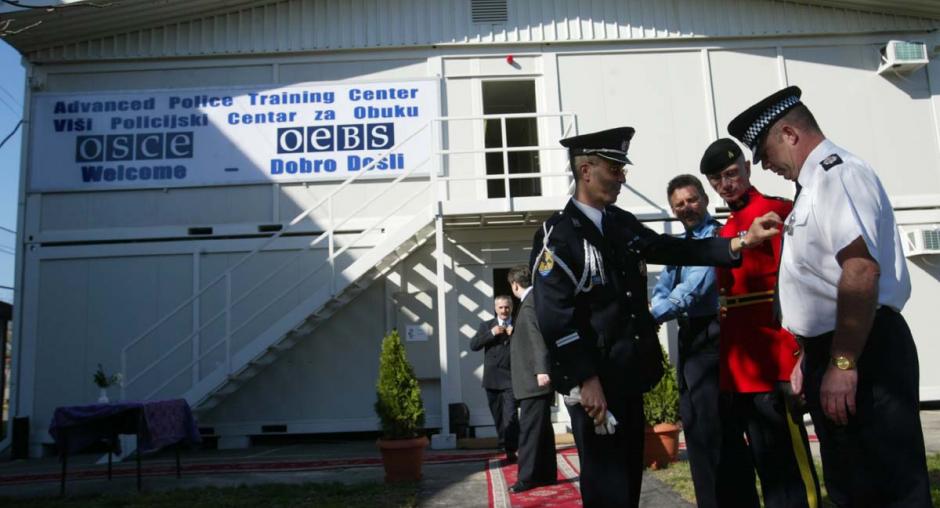Newsroom
OSCE Mission supports Serbian Interior Ministry in developing national strategy on community policing
POZEGA 1 June 2004

(Milan Obradovic)The OSCE's advanced police training centre in Belgrade, opened on 29 October 2002, is aimed at providing higher quality of policing for Serbia. (Milan Obradovic) Photo details
POZEGA, 1 June 2004 - The OSCE Mission to Serbia and Montenegro, its international partners and representatives of the Serbian Interior Ministry met in the Central Serbian town of Pozega today to agree on standards for evaluating progress on pilot community policing projects.
The evaluation of the pilot projects is very important for the possible expansion of the community policing concept throughout the country.
The meeting in Pozega gave participants an opportunity to exchange their experiences in the implementation of the projects. This will support the efforts of the Ministry of Interior in the development of their national strategy on community policing.
Pilot community policing projects are being implemented in 10 municipalities at present.
The OSCE Mission's Law Enforcement Department has been the co-ordinator of the international assistance to police reform in Serbia and Montenegro.
The community policing projects are run by the OSCE Mission in southern Serbia (Bujanovac, Presevo and Medvedja), by the Swiss Development Agency in Pozega, by the UK Department for International Development (DfID) in Zvezdara (Belgrade), Novi Becej, Kragujevac and Vrnjacka Banja, and by the Norwegian Police Service in Novi Sad and Backa Palanka.
The OSCE identified community policing as one of the six priority areas for police reform in Serbia in 2001 and the Interior Ministry has recognised the potential of community policing in developing a police service which is responsive to the needs of the public.
The development of community policing marks an important shift for the local police forces as it is aimed at creating a close relationship between the municipal authorities, civil society, the police and the community at large.
The evaluation of the pilot projects is very important for the possible expansion of the community policing concept throughout the country.
The meeting in Pozega gave participants an opportunity to exchange their experiences in the implementation of the projects. This will support the efforts of the Ministry of Interior in the development of their national strategy on community policing.
Pilot community policing projects are being implemented in 10 municipalities at present.
The OSCE Mission's Law Enforcement Department has been the co-ordinator of the international assistance to police reform in Serbia and Montenegro.
The community policing projects are run by the OSCE Mission in southern Serbia (Bujanovac, Presevo and Medvedja), by the Swiss Development Agency in Pozega, by the UK Department for International Development (DfID) in Zvezdara (Belgrade), Novi Becej, Kragujevac and Vrnjacka Banja, and by the Norwegian Police Service in Novi Sad and Backa Palanka.
The OSCE identified community policing as one of the six priority areas for police reform in Serbia in 2001 and the Interior Ministry has recognised the potential of community policing in developing a police service which is responsive to the needs of the public.
The development of community policing marks an important shift for the local police forces as it is aimed at creating a close relationship between the municipal authorities, civil society, the police and the community at large.
